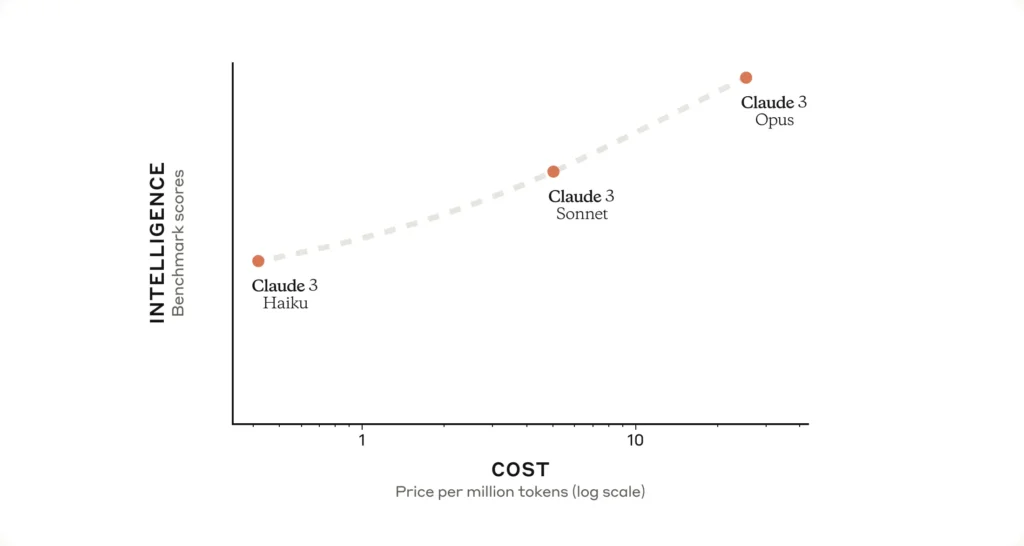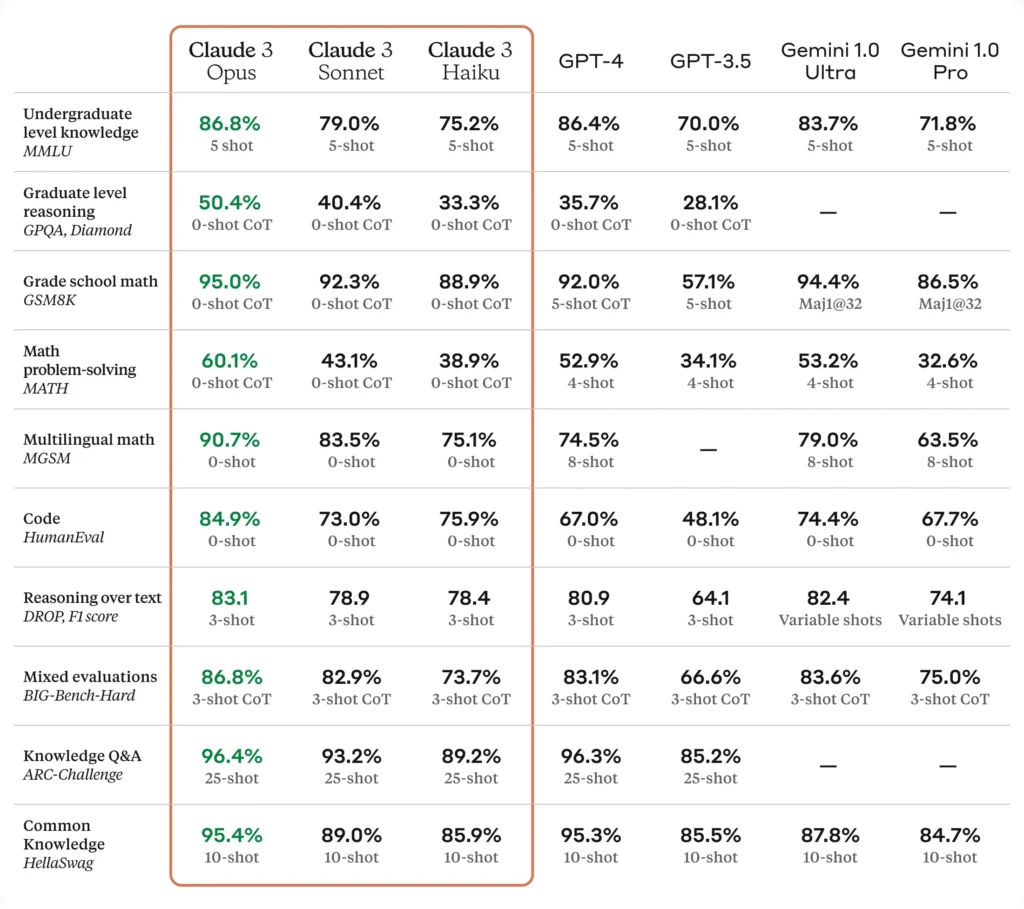The artificial intelligence landscape is evolving at an unprecedented pace, and Anthropic‘s latest offering, the Claude 3 family of AI models, stands at the forefront of this revolution. This comprehensive guide delves into the intricacies of the Claude 3 family, exploring its three distinct models—Haiku, Sonnet, and Opus—and their potential to transform industries across the board.
Understanding the Claude 3 Family
The Evolution of AI-Language Models
Before we dive into the specifics of the Claude 3 family, it’s essential to understand the context of AI language models’ evolution. Large Language Models (LLMs) have made significant strides in recent years, with each new iteration pushing the boundaries of what’s possible in natural language processing and generation.
According to a recent study by Stanford University’s Institute for Human-Centered Artificial Intelligence, the capabilities of LLMs have grown exponentially, with models like GPT-3 and its successors demonstrating remarkable improvements in language understanding and generation.
Introducing Claude 3: A New Benchmark in AI
Anthropic’s Claude 3 family represents the next leap forward in AI technology. Comprising three distinct models—Haiku, Sonnet, and Opus—this new generation of AI is designed to cater to a wide range of applications and user needs.
The Three Pillars of Claude 3

1. Claude 3 Haiku: Speed and Efficiency
Claude 3 Haiku is the nimblest member of the family, optimized for rapid response times and efficient processing. Its key features include:
- Lightning-fast response generation
- Ideal for real-time applications and chatbots
- Excellent for quick queries and simple tasks
2. Claude 3 Sonnet: Balancing Power and Practicality
Positioned as the middle-tier option, Claude 3 Sonnet offers a balanced approach to AI capabilities:
- Enhanced language understanding and generation
- Suitable for more complex tasks and analyses
- Improved context retention and coherence in longer conversations
3. Claude 3 Opus: Unparalleled Intelligence and Creativity
At the pinnacle of the Claude 3 family stands Opus, representing the most advanced AI capabilities:
- Superior reasoning and problem-solving abilities
- Exceptional creative writing and content generation
- Capable of handling highly complex and nuanced tasks
Comparative Analysis of Claude 3 Models
To better understand the strengths of each model, let’s compare their performance across various metrics:

| Feature | Haiku | Sonnet | Opus |
| Speed | ★★★★★ | ★★★★☆ | ★★★☆☆ |
| Complexity Handling | ★★☆☆☆ | ★★★★☆ | ★★★★★ |
| Creative Output | ★★★☆☆ | ★★★★☆ | ★★★★★ |
| Resource Output | ★★★★★ | ★★★☆☆ | ★★☆☆☆ |
This comparison highlights the trade-offs between speed, complexity handling, and resource requirements across the Claude 3 family.
Applications and Use Cases
The versatility of the Claude 3 family opens up a wide array of applications across various industries:
1. Customer Service and Support
Claude 3 Haiku’s speed makes it ideal for handling customer inquiries in real time, while Sonnet and Opus can tackle more complex customer issues that require deeper understanding and problem-solving skills.
2. Content Creation and Marketing
From generating product descriptions to crafting entire marketing campaigns, the Claude 3 family can revolutionize content creation. Opus, in particular, excels in producing high-quality, creative content that rivals human-written material.
3. Research and Analysis
In fields such as finance, healthcare, and academia, Claude 3 Opus can assist in analyzing vast amounts of data, generating hypotheses, and even contributing to the peer review process.
4. Software Development and Coding
All three models can assist in various aspects of software development, from code generation and debugging to documentation writing. The IEEE has highlighted the potential of AI in revolutionizing software engineering practices.
5. Education and Training
The Claude 3 family can be leveraged to create personalized learning experiences, generate educational content, and provide instant tutoring services to students across various subjects and skill levels.
The Impact on Industries
The introduction of the Claude 3 family is set to have far-reaching implications across multiple sectors:
- Healthcare: Enhancing diagnostic accuracy and treatment planning
- Finance: Improving risk assessment and fraud detection
- Legal: Assisting in legal research and contract analysis
- Manufacturing: Optimizing supply chains and predictive maintenance
- Entertainment: Generating scripts, music, and interactive storytelling
Ethical Considerations and Responsible AI
As with any advanced AI technology, the deployment of the Claude 3 family raises important ethical considerations. Anthropic has emphasized its commitment to responsible AI development, focusing on:
- Transparency in AI decision-making processes
- Mitigating bias and ensuring fairness
- Protecting user privacy and data security
- Adhering to ethical guidelines in AI deployment
The IEEE Global Initiative on Ethics of Autonomous and Intelligent Systems provides a comprehensive framework for addressing these concerns.
The Future of AI with Claude 3
The Claude 3 family represents a significant milestone in the evolution of AI technology. As these models continue to be refined and integrated into various applications, we can expect to see:
- Increased adoption of AI across industries
- More sophisticated human-AI collaboration
- Advancements in AI-driven scientific discovery
- Continuous improvements in natural language understanding and generation
Conclusion
The Claude 3 family—Haiku, Sonnet, and Opus—marks a new era in artificial intelligence, offering a range of capabilities that cater to diverse needs and applications. From rapid-response chatbots to complex problem-solving and creative content generation, these models are poised to transform how we interact with and leverage AI technology.
As we continue to explore the potential of these advanced language models, it’s crucial to balance innovation with responsible development and deployment. The Claude 3 family not only pushes the boundaries of what’s possible in AI but also sets a new standard for ethical and impactful artificial intelligence.







